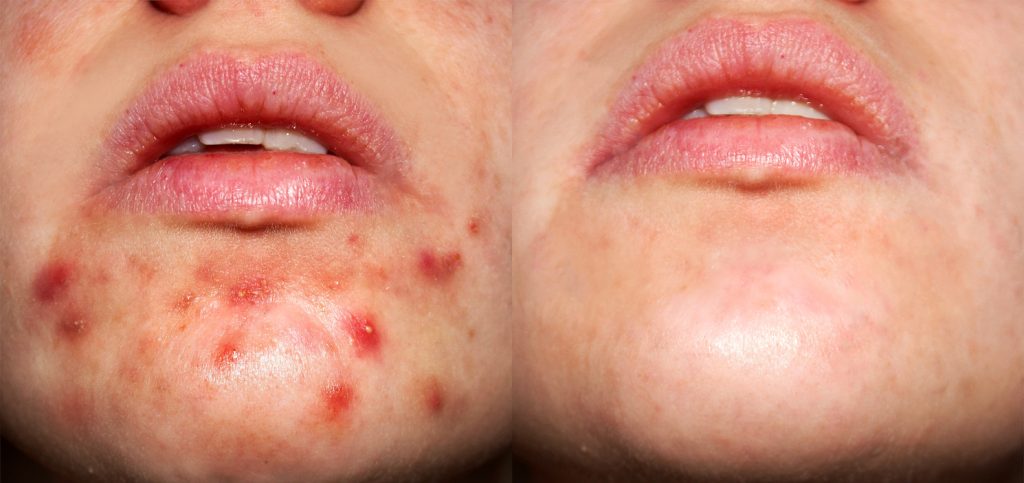Consider an oral antihistamine in patients with severe inflammatory acne on isotretinoin who are at risk of purging, suggests Carol Cheng, MD, who directs the acne clinic at the University of California-Los Angeles (UCLA).
The rationale for this strategy is based on a randomized trial of 40 patients with mild-to-moderate acne who were assigned to receive isotretinoin alone or isotretinoin plus desloratadine1. At Week 12, patients receiving both isotretinoin and desloratadine showed a significantly greater reduction in acne lesion counts compared to those receiving isotretinoin alone (non-inflammatory lesions: 44.8% vs. 17.8%, respectively; inflammatory lesions: 55.8% vs. 22.9%; total lesions: 45.6% vs. 18.7).
A more recent, larger study confirmed these results, finding that the rate of isotretinoin-induced acne flaring dropped significantly from 30% in those who received isotretinoin alone down to 5% in the group that took isotretinoin plus levocetirizine2.
Dr. Cheng offered this advice and other practical strategies for managing the common and often challenging side effects of isotretinoin in acne treatment during a talk at a joint meeting of California Society of Dermatology and Dermatologic Surgery (CalDerm) and the Pacific Dermatologic Association (PDA) in San Diego, CA.
Other clinical pearls include:
- Recommend 1,000mg oral omega-3 to improve dryness, triglycerides. and absorption of isotretinoin. This suggestion is partly based on findings from a randomized trial of 118 patients on isotretinoin that sought to evaluate efficacy of omega-3 in reducing mucocutaneous side effects of isotretinoin. Patients were assigned to receive isotretinoin alone or isotretinoin plus 1,000mg omega-3. At Weeks 4, 8, 12 and 16, cheilitis, xerosis, and dryness of eyes and nose were less frequent in patients who received the concomitant omega-3 supplement, compared to those who received tretinoin alone. 3“Patients should be counseled to check labels to ensure that they’re getting the correct amount of omega-3s, rather than any type of fish oil,” says Dr. Cheng, who also directs the pediatric dermatology fellowship at UCLA. “You can also prescribe omega-3 alongside isotretinoin. For patients avoiding fish, algae and flaxseed are also good vegan alternatives.” She adds that omega-3s offer two additional benefits: enhancing isotretinoin absorption and helping to lower triglyceride levels.
- Continue isotretinoin until the patient is clinically clear for two months before stopping treatment and aim for a higher cumulative dose to minimize acne relapse. This pearl is partly based on findings from a retrospective review of 160 patients who took one course of isotretinoin compared with 82 patients who underwent two courses.4 Compared with a patient who underwent one course of isotretinoin, those who required a second course received a lower cumulative dose (128.1 vs. 159mg/kg, respectively) and had a shorter duration of treatment after acne clearance (32 vs. 65.4 days). A separate, more recent cohort study of 19,907 patients who took isotretinoin found that 22.5% experienced acne relapse and 8.2% underwent a second course5. Stratification by cumulative dosage showed that higher cumulative dosage was associated with decreased rates of relapse. However, no significant differences were seen with maximum daily doses.
- Consider L-carnitine 1,000mg daily for patients with isotretinoin-induced myalgias. “L-carnitine is a small molecule involved in mitochondria energy production, and it’s known that a deficiency can cause myalgias,” Dr. Cheng notes. “It’s also thought that isotretinoin can contribute to carnitine deficiency, which can explain why some of our patients experience muscle soreness while on treatment.” In a study that investigated the efficacy of reducing isotretinoin-induced myalgias with L-carnitine, 40 of 230 patients who were taking isotretinoin were found to have myalgias. Of these, 20 received a L-carnitine supplement (100/kg/mg/day) for 45 days, while the other 20 received a placebo. The researchers found that patients on L-carnitine supplementation had resolution of myalgias after five to six days. Patients were also noted to have decreased L-carnitine levels during isotretinoin treatment.
“I typically recommend 1,000 milligrams of L-carnitine daily,” Dr. Cheng says. “In my experience, I find that this almost always resolves their symptoms while keeping them on isotretinoin.” Session moderator E. James Song, MD, Director of Clinical Research at Frontier Dermatology in Bothell, WA., tells The Dermatology Digest that acne “remains one of the most common reasons patients seek dermatologic care, yet management can be varied and often based on anecdotal experiences.” He continues, “Dr. Cheng provided a comprehensive, evidence-based framework that was both clinically relevant and practically applicable.”
-Doug Brunk
References:
- Lee HE, Chang IK, Lee Y, et al. Effect of antihistamine as an adjuvant treatment of isotretinoin in acne: a randomized, controlled comparative study. J Eur Acad Dermatol Venereol. 2014;28(12):1654-60. https://pubmed.ncbi.nlm.nih.gov/25081735/
- Pandey D , Agrawal S . Efficacy of Isotretinoin and Antihistamine versus Isotretinoin Alone in the Treatment of Moderate to Severe Acne: A Randomised Control Trial. Kathmandu Univ Med J (KUMJ). 2019;17(65):14-19. https://pubmed.ncbi.nlm.nih.gov/31734672/
- Mirnezami M, Rahimi H. Is Oral Omega-3 Effective in Reducing Mucocutaneous Side Effects of Isotretinoin in Patients with Acne Vulgaris? Dermatol Res Pract. 2018;2018:6974045. https://pubmed.ncbi.nlm.nih.gov/30002675/
- Tran PT, Berman HS, Leavitt E, Hogeling M, Cheng CE. Analysis of factors associated with relapse in patients on their second course of isotretinoin for acne vulgaris. J Am Acad Dermatol. 2021;84(3):856-859. https://pubmed.ncbi.nlm.nih.gov/33096132/
- Lai J, Barbieri JS. Acne Relapse and Isotretinoin Retrial in Patients With Acne. JAMA Dermatol.2025;161(4):367–374. ttps://jamanetwork.com/journals/jamadermatology/article-abstract/282925
- Georgala S, Schulpis KH, Georgala C, Michas T. L-carnitine supplementation in patients with cystic acne on isotretinoin therapy. J Eur Acad Dermatol Venereol. 1999;13(3):205-9. https://pubmed.ncbi.nlm.nih.gov/10642057/


